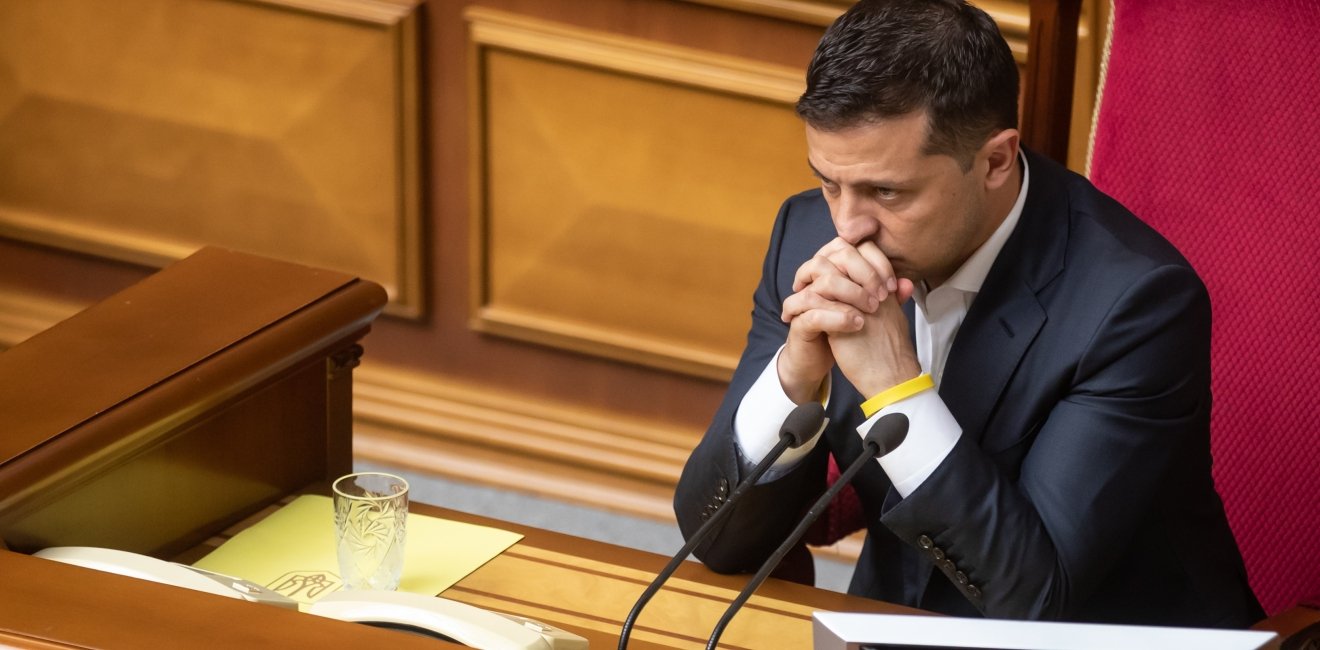
A blog of the Kennan Institute
BY ANDRIAN PROKIP
One year after Volodymyr Zelenskyy won election to the presidency in Ukraine, he faces a number of challenges. He must address the COVID-19 pandemic and the economic recession simultaneously—an enormous challenge for any leader. But the biggest problem for him is loss of the nation’s trust and voters’ support. If the first two issues were caused by external factors, the loss of trust originates in his own actions and an overhang of unfulfilled promises.
A quick loss of trust in the president has been almost a political tradition in Ukraine over the past fifteen years. It happens for two reasons. First, voters usually have unnaturally high expectations of their candidate. The lack of tangible achievements in the months after the electoral victory quickly leads to disappointment. Second, once they have acceded to the presidency and taken up the actual problems of governance, former candidates seem to quickly forget about their election pledges, disregard the interests of their allies, and enter the minefield of Ukrainian politics with decisions that increasingly arouse suspicions of corruption. Soon after they take office, presidents seemed to become the opposite of the candidates they were.
Thus, trust in President Viktor Yushchenko (2005–2010), elected after the Orange revolution in 2004, was seriously undermined by the scandal surrounding his elder son’s lifestyle, disrespectful communication with journalists, and a series of corruption scandals revolving around his team; his trust rating fell 29 percentage points in the first year of his administration, from 67 percent in 2005 to 38 percent in 2006. President Viktor Yanukovych (2010–2014) sustained a 24 percentage point lost in trust ratings (from 54 percent in 2010 to 30 percent in 2011), mainly because of his clan’s attempts to consolidate power and assets in their hands. President Petro Poroshenko (2014–2019) was the biggest loser of trust in the first year of his administration (from 69 percent in 2014 to 32 percent in 2015, a 37 percentage point loss), mainly because of the progress of the war, a retreat of the economy and social safety, and unfulfilled promises.
The high level of support Zelenskyy enjoyed in 2019 owed to profound fatigue with both pre- and post-Maidan professional politicians and the hope that a person outside the intrigues of Ukrainian politics could improve the lives of ordinary people. But it seems that President Zelenskyy will be beset by the same curse that afflicted his predecessors. His trust rating fell from 71 percent in September 2019 to 46 percent in March 2020, a loss of 25 percentage points in a remarkably short time.
The major factors contributing to the growing distrust in President Zelenskyy include the following:
Corruption scandals. The most recent corruption scandal is connected to Andriy Yermak, the newly appointed head of the presidential administration. On March 29, Geo Leros, an MP representing the Servant of the People faction in the Rada, published a video in which Yermak’s brother appears to offer an appointment to public office in exchange for a financial consideration. Several days later Andriy Yermak denied the accusations. But the most notable part of this scandal is President Zelenskyy’s silence on the matter. An ardent critic of corruption a year ago, Zelenskyy seems to have forgotten about his former condemnation of officials suspected of corruption.
No concrete steps toward justice. A fundamental plank in Zelenskyy’s campaign platform was a promise to pursue corruption charges against politicians of the Poroshenko era. But almost a year into his term in office, after several highly publicized arrests, there have been no investigation results or court hearings, and those arrested were all released. This prosecutorial inefficacy was one of the reasons why Zelenskyy fired Prosecutor General Ruslan Ryaboshapka in March 2020.
Tolerance of scandals on his team. The current president’s silence is strikingly different from his zero-tolerance attitude toward corruption and the firm promise of justice a year ago. And this silence will most probably accelerate the loss of trust in Zelenskyy.
Siding with Petro Poroshenko. After his unprecedented political success as a candidate in 2019, Volodymyr Zelenskyy today has been backed into a corner by his earlier missteps as president. His first cabinet failed to enact the reforms desired by the electorate and so lost public trust, with the result that he had to appoint a new cabinet in March 2020. The presidential one-party majority in the Rada, which rapidly approved whatever draft laws were offered by the president’s team, seems to be functioning in a less and less orderly fashion this spring. Internal cleavages have appeared, threatening party unity. More and more MPs from the Servant of the People party are revolting against the presidential administration under Zelenskyy’s handpicked chief of staff and demanding personal meetings with the president. Thus, to get Rada approval for the land reform measures or the “Anti-Kolomoiskyi Law,” Zelenskyy had to look for support among his opponents, most notably his defeated campaign adversary, former president Petro Poroshenko.
It seems that the president is losing control over parliament, and his cooperation with Poroshenko is toxic to Zelenskyy’s popularity.
Losing support in parliament is bad enough. But losing the people’s trust because of unfulfilled promises will signal a total failure. And more and more Ukrainian political experts, not necessarily neutral on the matter, are wondering aloud whether President Zelenskyy will remain in office to the end of his official term in 2024.
The opinions expressed in this article are those solely of the author and do not reflect the views of the Kennan Institute.
Author

Director, Energy Program, Ukrainian Institute for the Future

Kennan Institute
After more than 50 years as a vital part of the Wilson Center legacy, the Kennan Institute has become an independent think tank. You can find the current website for the Kennan Institute at kennaninstitute.org. Please look for future announcements about partnership activities between the Wilson Center and the Kennan Institute at Wilson Center Press Room. The Wilson Center is proud of its historic connection to the Kennan Institute and looks forward to supporting its activities as an independent center of knowledge. The Kennan Institute is committed to improving American understanding of Russia, Ukraine, Central Asia, the South Caucasus, and the surrounding region through research and exchange. Read more

Explore More in Focus Ukraine
Browse Focus Ukraine
Talking to the Dead to Heal the Living

Ukrainian Issue in Polish Elections


